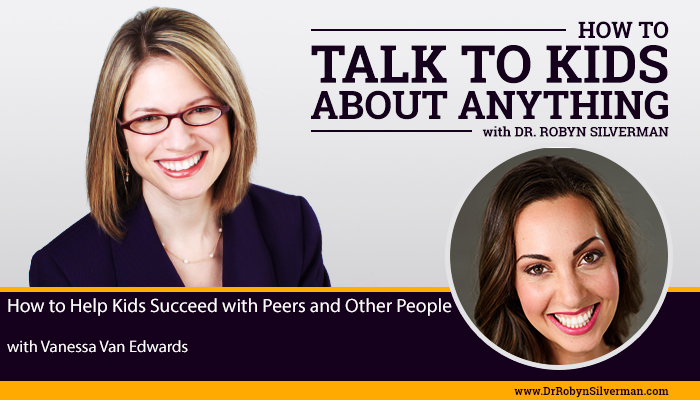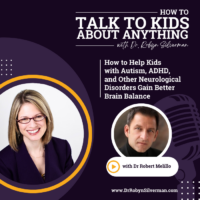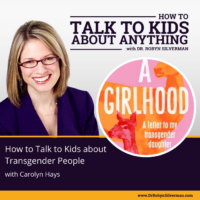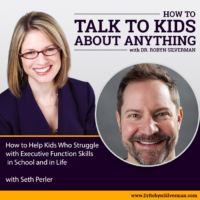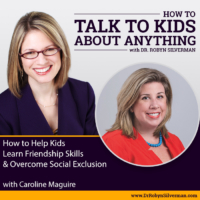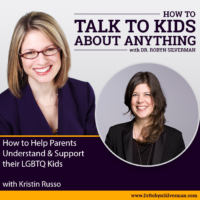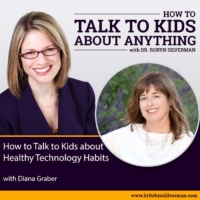Podcast: Play in new window | Download
Subscribe: Apple Podcasts | RSS | More
How to Help Kids Succeed with Peers and Other People
This podcast will focus on how to help kids and teens can use science to learn how to succeed with people. Understanding your own personality as well as the best way to use your social skills, can help attract the right people into your life. Certain ‘life hacks’ can make a huge difference if you know how to employ them in which situations. Dr. Robyn Silverman and Charisma author, Vanessa Van Edwards discuss how to best help young people succeed with peers and other people in their lives on the How to Talk to Kids about Anything podcast.
Are you a recovering awkward person? My next guest states she is—although you’d never know it given her amazing insights and understanding of what she has branded, The Science of People. As we know from being a child and certainly a preteen or teenager, we all feel awkward from time to time. Maybe some of us more than others. My own palms get sweaty just thinking about walking into school on the first day of school, after a fight with a friend- or worse, a break up. Blargh. And what about when walking into a party or school event when you aren’t sure who will be there—or when you do and the people who are there aren’t exactly the people you jive with. Do people even say “jive” anymore? Anyway, what if we could tap into the science of people so that we can give the kids and teens in our lives some hacks that allow them to be successful in social situations? And what if some of these hacks could help us connect better and have better conversations with our kids? That would be pretty great, wouldn’t it?
Vanessa Van Edwards is lead investigator at the Science of People—a human behavior research lab. She is the national bestselling author of Captivate: The Science of Succeeding With People which was chosen as one of Apple’s Most Anticipated Books of the year. Her work has been featured on CNN, NPR and Fast Company. She writes a monthly column on the science of success for Entrepreneur Magazine and the Huffington Post. She even has a successful Ted Talk which is awesome. She speaks worldwide and I couldn’t be more thrilled to have her stop by our show today.
The podcast provides:
- Hacks that help kids/teens in social situations when they feel awkward
- How being an extrovert, introvert or ambivert can impact the advice we give to kids in social situations
- What kids need to stop doing that is hurting their social situations
- How kids can “find their people.”
- How we can teach kids to highlight and see the good in others
- How kids can connect better to other people
Important Messages:
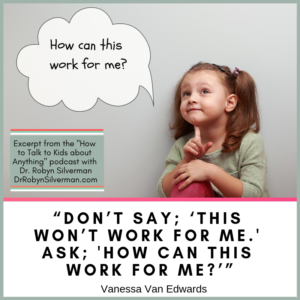 Parents/educators often try to help but sometimes do more harm than good. “Just be yourself” can be confusing for someone who lacks the confidence and social skills to thrive in social situations.
Parents/educators often try to help but sometimes do more harm than good. “Just be yourself” can be confusing for someone who lacks the confidence and social skills to thrive in social situations.- It’s helpful to know where you get social energy. Do you get it from other people or do you do it by being alone and recharging? These are very different ways to approaching your day or the school day. If you are an introvert- you need breaks in your day. You need to be able to ask your parent, after school, if you can have quiet time in the car. “Can we make the car ride from school to soccer practice, recharge time?”
- For extroverts- they may need to play with a sibling or friends when they get home.
- There are no bad personality traits. Introverts do a really good job of observing and listening. Extroverts do a really good job of making connections and building friendships. Ambiverts- flexible skills- situational introverts and extroverts. Which situations charge you and which situations drain them?
- Awareness first. Activate a set of boundaries (how do they break up their day- how do they distribute social energy?) Then optimize in a way that really work for them?
- Lots of people are not socially awkward in ALL situations but rather in some situations. How can we teach social skills that can be used in different situations as they are needed?
- Worst advice (well-meaning adults) is to be popular and be well-liked- be friendly, smile more. But if you are an introvert- it’s like telling someone to be someone s/he is not.
- Skill- for example- Introverts- get lay of land, then when you get to your bunk, put some of your things away and look around and see if anyone else has something similar to you. And in the quiet of your bunk similar stuffed animal, gear, “hey, I have that too.” Much easier way to make connections, have a conversation in the intimacy of a smaller setting, using a shared item.
- Give REALLY specific tools that are based on personality trait instead of having them pretend to be something they are not.
- Ask your kids- how can we make this work for you? Teens can take content to another level.
- Skill: Don’t say, this won’t work for me. Say- how can this work for you?
- Van Slone: Why are popular kids popular? The popular kids liked more people—so more people liked them!
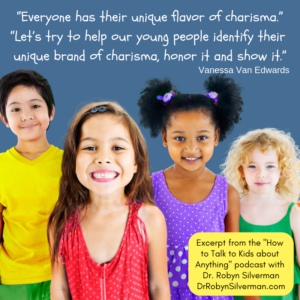
- Neurotics- worry about things.
- Play the game in your mind: What if I had to introduce this person to someone else, in 15 minutes, what do they have that’s brag-worthy? Did you do anything fun this weekend (better than what’s up? Or How are you?)
- Vulnerability effect: Sharing a vulnerability—then, someone else wants to share a vulnerability. If you want them to tell you something that’s awkward or vulnerable- start off with a personal vulnerability. Share about your own life. Then they’ll share their life.
- Franklin effect. Asking for a favor: Ben Franklin. People more likely to like you. You can ask for advice, for example. “I have no idea how to approach this with you. I’ve done some Google research. Can you walk me through this?”
- “They made me watch this video. It was really awkward. We were giggling!” Sharing this vulnerability can open the door.
- Bubbly extrovert for girls/women and the funny joke-teller for men/boys is often idealized. Remember- everyone is different and everyone has their unique flavor of charisma.
- Use role models. Powerful charisma. Connector, nurturer, empathetic charisma.
- We need to teach teens both verbal and nonverbal skills. Reading social cues- facial expressions, stance. Watch TV together and point out the nonverbal cues, talk about it when you are in public places.
Notable Quotables:
- “If you don’t like yourself, it’s very hard to be yourself.”
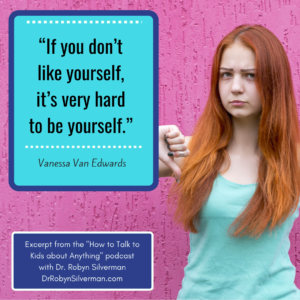
- “We have limited social energy. We have work energy, we have exercise energy, we have romantic energy and we also have social energy. This is the amount of energy you have for interactions, to make first impressions, to make conversation, to do chit-chat and to make friends. Extroverts get social energy and create social energy when they are around people. Introverts create or get social energy when they recharge by themselves.”
- “We need to help children set up their lives in a way that honors their personality traits.”
- “I think the greatest gift we can give our young people is to tell them; ‘you are great the way you are and we should optimize for that.”
- “The worse advice I was given, by well-meaning adults, was to be friendly, smile more and just walk up and start talking to people. But if you are an introvert- it’s like telling someone to be someone s/he’s is not.”
- “Don’t say; ‘this won’t work for me. Ask; how can this work for me?’”
- “Want more people to like you? You are better off walking into camp, youth group or school and thinking; ‘how can I like as many people as possible? What do I have to find out about these people so I can find a way to like them?’ That is the fastest way to get more people to like you. It’s not being prettier. It’s not having a great Instagram. It’s not having a higher GPA. It’s not running for student council. It’s not telling funny jokes or having cool clothes. It’s just; ‘how can I find a way to like more people?’ That’s how you get more people to like you. That’s a very empowering way to walk through the hallways.”
- “Everyone has their unique flavor of charisma.”
- “Let’s try to help our young people identify their unique brand of charisma, honor it and show it.”

